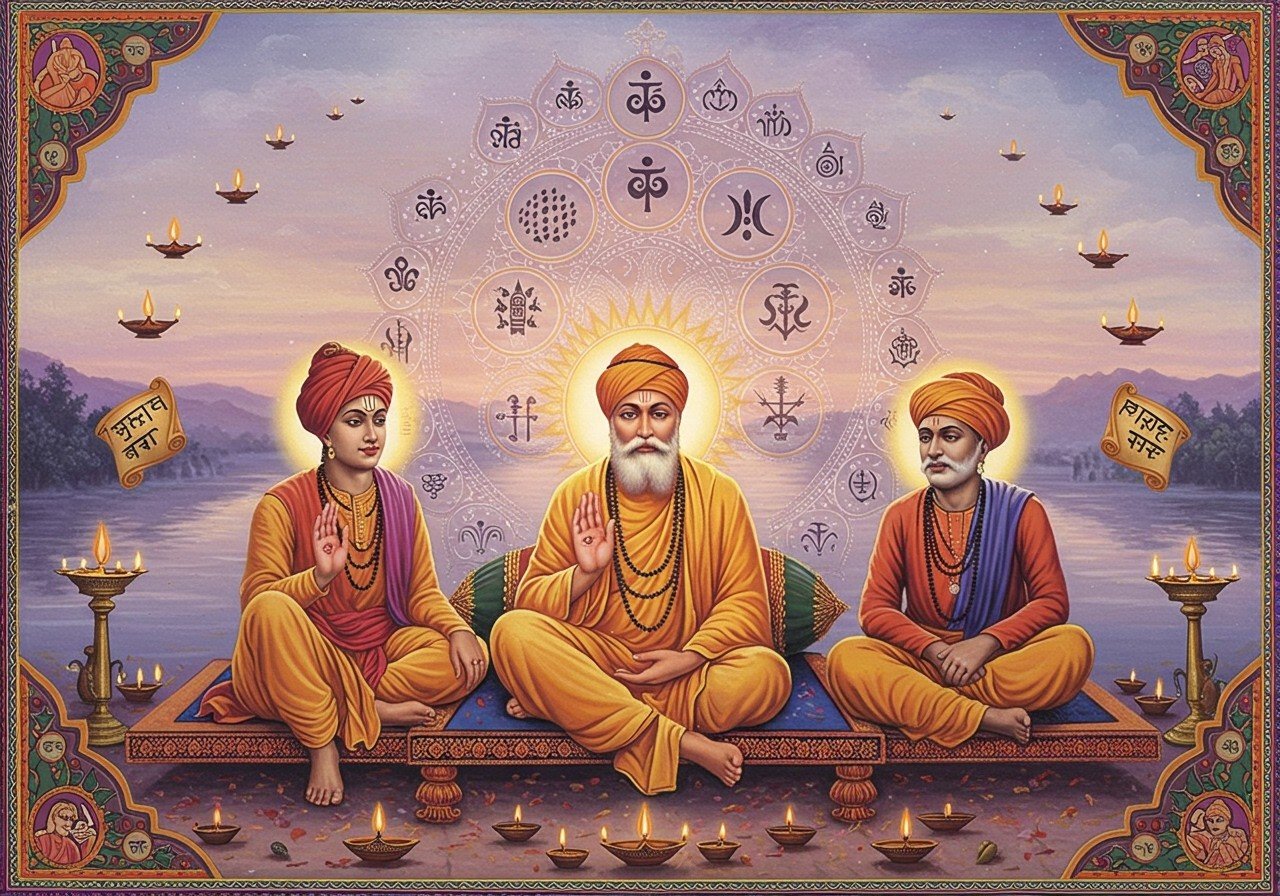
India’s spiritual heritage is a vibrant tapestry of diverse beliefs and traditions. Spiritual leaders have profoundly shaped the nation’s values and customs, guiding individuals on paths of self-discovery and enlightenment. Among these luminaries, Sant Ravidas shines brightly, particularly for his contributions to the Bhakti movement and his unwavering emphasis on spiritual equality. This blog delves into Ravidas’s philosophies, comparing and contrasting them with other influential figures like Kabir, Guru Nanak, and Meerabai. We will also touch upon broader themes of spiritual leadership, drawing insights from the teachings of Gautama Buddha and Jesus Christ.
Ravidas and Kabir: A Shared Legacy of Devotion and Social Reform
Ravidas and Kabir, two pillars of the Bhakti movement, shared a deep commitment to devotion to a formless divine. Both challenged the rigid caste system prevalent in their time, advocating for social equality and spiritual liberation for all. However, their approaches to rituals and religious practices diverged. Ravidas integrated certain rituals into his teachings, while Kabir often critiqued established religious orthodoxy.
Their writings reflect these subtle differences. Ravidas’s poetry emphasizes devotion and love as pathways to spiritual enlightenment, often employing vivid imagery and metaphors to convey his message. Kabir’s verses, on the other hand, frequently question the necessity of elaborate rituals, emphasizing direct experience of the divine. The interpretations of their teachings have evolved over time, reflecting the enduring influence of both leaders on spirituality and social reform in India.
Ravidas and Guru Nanak: Harmony in Equality and Devotion
A profound bond connects Ravidas and Guru Nanak through their shared teachings on equality and unwavering devotion. Both emphasized devotion to one God and envisioned a society free from the shackles of discrimination. Their messages of social justice resonated deeply, challenging the ingrained inequalities of the caste system.
Guru Nanak’s reverence for Ravidas is evident in the inclusion of Ravidas’s hymns in the Guru Granth Sahib, the sacred scripture of Sikhism. This inclusion underscores their spiritual alignment. While both championed devotion, their perspectives on organized religion differed. Ravidas often embraced certain rituals, while Guru Nanak advocated for direct devotion without intermediaries.
Their teachings continue to inspire social reform and shape religious practices today. Many find guidance in their shared values of compassion and equality, principles that remain remarkably relevant in modern times.
Ravidas and Meerabai: A Tapestry of Devotion and Courage
Meerabai, a Rajput princess, found profound inspiration in Ravidas’s teachings. She embraced a path of unwavering love and devotion, expressing her spiritual journey through poignant poetry that reflects Ravidas’s influence. Meerabai’s bhajans celebrate personal communion with the divine, echoing Ravidas’s emphasis on direct spiritual experience.
Both figures challenged societal norms and expectations. Ravidas, born into a marginalized community, and Meerabai, a royal who defied convention, prioritized devotion above all else. Their courage continues to inspire individuals to seek authentic spiritual expression. Though their backgrounds shaped unique spiritual journeys, their messages resonate deeply with seekers today. Devotees and artists alike draw inspiration from their legacy of love, devotion, and spiritual fulfillment.
Philosophical Themes in Ravidas’s Teachings and Their Modern Relevance
Love and Devotion (Bhakti): The teachings of Ravidas, Kabir, Guru Nanak, and Meerabai are deeply rooted in the concept of bhakti, emphasizing love and devotion as the primary paths to spiritual realization. This emphasis on personal connection with the divine stands in contrast to rigid rituals and external practices, offering a more direct and accessible path to spiritual fulfillment.
Equality and Compassion: These spiritual leaders championed equality and compassion, challenging social inequalities and caste discrimination prevalent in their time. Their teachings promoted a society where everyone, regardless of their social standing, could experience spiritual liberation. These themes continue to resonate with contemporary social justice movements, guiding those seeking spiritual meaning and social transformation.
Relevance in the Digital Age: Ravidas’s teachings remain remarkably relevant in today’s fast-paced world. Online platforms and social media have become instrumental in preserving and disseminating his messages, reaching new generations and fostering a sense of unity among diverse communities. In a world often fragmented, Ravidas’s philosophy of love, equality, and devotion provides a beacon of hope and a path towards a more compassionate and harmonious society.
Spiritual Leadership: A Broader Perspective
Drawing inspiration from diverse spiritual traditions, including those of Gautama Buddha and Jesus Christ, we can understand spiritual leadership as a holistic approach that nurtures purpose, meaning, ethical behavior, and well-being. It emphasizes shared values, interconnectedness, and personal growth, fostering a sense of community and inspiring individuals to realize their full potential.
Qualities of a Spiritual Leader: Spiritual leaders embody qualities such as integrity, authenticity, empathy, and humility. They possess a deep understanding of spiritual teachings and communicate with compassion, guiding others on their own spiritual journeys.
Spiritual Leadership in the Workplace: Integrating spiritual principles into the workplace can create a more meaningful and fulfilling work experience. By fostering a culture of altruistic love and shared purpose, organizations can empower their teams to contribute meaningfully and make a positive impact.
How Poojn.in Supports Your Spiritual Journey
Poojn.in, India’s leading online store for cultural and spiritual goods, offers a wide selection of products to support your spiritual practices. Discover items for honoring revered figures like Sant Ravidas, Kabir, Guru Nanak, and Meerabai. Explore our diverse collection:
-
Complete Puja Samagri: Find everything you need for pujas and rituals with our curated kits, containing authentic materials sourced responsibly. Explore our Puja Kits.
-
Sacred Texts and Books: Deepen your understanding of spiritual philosophies with our collection of sacred texts and books on various saints and their teachings. Browse our Spiritual Books.
-
Brass and Copper Items: Enhance your worship space with beautifully crafted brass and copper items like diyas, incense holders, puja thalis, and water containers. Shop Brass and Copper Items.
-
Pure Cotton Items: Find essential pure cotton items such as prayer mats, aasans, and cloths for covering sacred objects. Shop Pure Cotton Items.
-
Authentic Agarbatti and Dhoop: Create a serene atmosphere for prayer with our premium incense sticks and dhoop made from natural ingredients. Explore our Incense Collection.
Visit Poojn.in today to discover a wide range of products for your spiritual needs. We offer secure packaging and doorstep delivery across India.
Conclusion: Embracing Timeless Wisdom for a Brighter Future
Sant Ravidas, alongside other spiritual luminaries like Kabir, Guru Nanak, and Meerabai, illuminated a path towards spiritual enlightenment and social harmony. Their teachings, woven with threads of devotion, equality, and love, remain remarkably relevant in our modern world. By embracing their timeless wisdom, we can navigate contemporary challenges with compassion and understanding, striving to build a society where equality and unity flourish.


